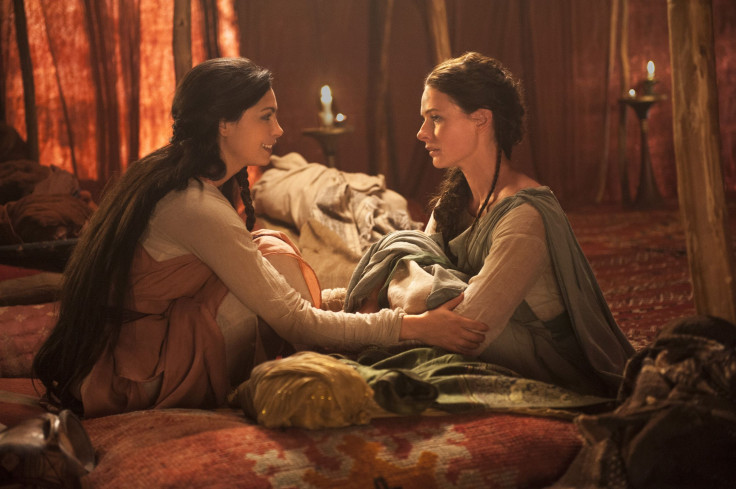‘The Red Tent’: 3 Things To Know Ahead Of The Biblical Miniseries Premiere

Anita Diamant’s bestselling novel “The Red Tent” has been a book club favorite for nearly a decade. Now the book, based on the biblical story of Dinah, will air on television in a two-part miniseries on Lifetime beginning Sunday.
Based on the novel, the miniseries is a first-person account of Dinah (played by Rebecca Ferguson), the daughter of Leah (Minnie Driver) and Jacob (Iain Glen, “Game of Thrones”) in the Book of Genesis. Unlike the biblical story which takes up only one chapter, Diamant’s book expands on the secondary character. Some critics say Diamant went too far -- that too many elements of the biblical narrative were changed. Others say the book can be classified as midrash – an interpretation of Jewish text.
In an interview with Reform Judaism Magazine, Diamant said she did not set out to rewrite the Bible but to “use Dinah’s silence to try to imagine what life was like for women in this historical period.”
So far, reviews for “The Red Tent” have been positive. Variety called the miniseries a “handsome melodrama” that puts a female spin on a male-centered tale. The New York Daily News said the plot an “aggressively feminist story painted on a canvas straight out of 'The Ten Commandments.'” The New York Post said the film was a “testament to solid acting.”
For those unfamiliar with the book and the biblical tale, below are three things you need to know about “The Red Tent” ahead of the film’s premiere.
The Biblical Story
Unlike major female biblical characters like the matriarchs Rachel, Leah and Sarah, Dinah is relatively obscure. And her story is quite brief.
As told in Chapter 34 in the Book of Genesis, Jacob’s only daughter gets raped by Shechem, the Hivite prince of the region, who then wants to marry her. When Shechem’s father asks Jacob if his son can have Dinah’s hand in marriage, Jacob agrees under the condition that all the men in the city be circumcised. While the men are recovering, two of Jacob’s sons attack the city and rescue Dinah.
The city where the story takes place was known to be a diverse region filled with people from different background, customs and religions. The massacre leaves Jacob in a precarious position. His formerly peaceful coexistence with the indigenous people of the land is now jeopardized. At the end of the story, he scolds his sons. They respond with the question, “Should our sister be treated like a whore?”
The Book
Unlike the biblical story, in Diamant’s novel Dinah is not raped. Instead she falls in love with the prince, Shalem, whom she meets when she is called as a midwife to deliver the son of the king’s concubine. The queen likes Dinah and schemes to get her son and Dinah together – despite the fact they come from different tribes. Eventually, Dinah and Shalem have sex. When Shalem offers Jacob a bride price, he refuses. His sons ask for all the men in the city to be circumcised. The king agrees. Several days later, when the men in the city are recovering, the two brothers attack the town and bring Dinah back.
Dinah is outraged and leaves her father’s camp. She goes to Egypt with Shalem’s mother, Re-nefer, where she discovers she is pregnant with Shalem’s child. Dinah agrees that the child should be raised as Re-nefer’s son since he would be considered a prince of Egypt. Later, Dinah becomes a successful midwife in the town and meets a carpenter who becomes her husband.
Perhaps the largest departure from the biblical narrative is Dinah’s voice. In Scripture, her perspective is unknown. It’s this silence that led Diamant to write the novel in the first place.
"Her total silence cried out for explanation," Diamant told Ms. Magazine, "so I decided to imagine one."
Interpretations
Diamant is not alone in removing rape from Dinah’s story. Some interpretations point to the final question in the story when the brothers call Dinah a whore as evidence that the sex between the two characters was consensual.
“Prostitutes engage in sexual intercourse for financial gain, and their sexual actions involve mutual consent. Rape therefore does not characterize either prostitution or what has happened to Dinah,” according to the Jewish Women’s Archive encyclopedia. A 1994 study into the story found that Dinah’s story was less about assault and more about “group-oriented dynamics.” That is, the story speaks about how the Israelites communicated with outsiders and established social marriage boundaries. Other interpretations focus on the brother’s crimes rather than the prince’s.
For Diamant, the prince’s actions speaks louder than the one word that denoted rape. “[The prince] doesn’t act like a rapist. He submits to what was then a very humiliating request in order to marry Dinah,” she told Christianity Today.
Despite the criticism and varying interpretations of the text, Diamant remains committed to her novel as a work of fiction. “I have freedom as a novelist,” she said. “My responsibility is to tell a good story.”
Lifetime’s miniseries “The Red Tent,” based on the best-selling novel by Anita Diamant, premieres Dec. 7 and Dec. 8 at 9/8c.
© Copyright IBTimes 2025. All rights reserved.






















